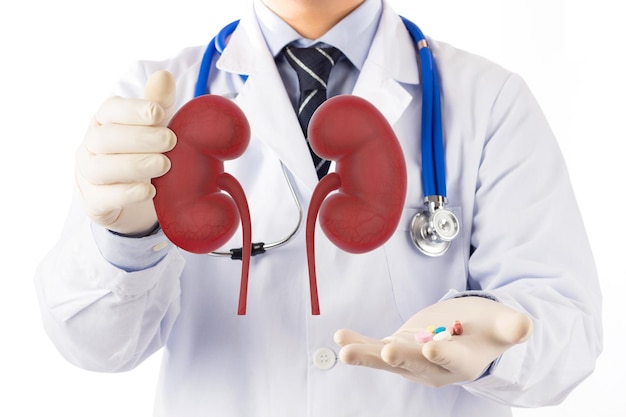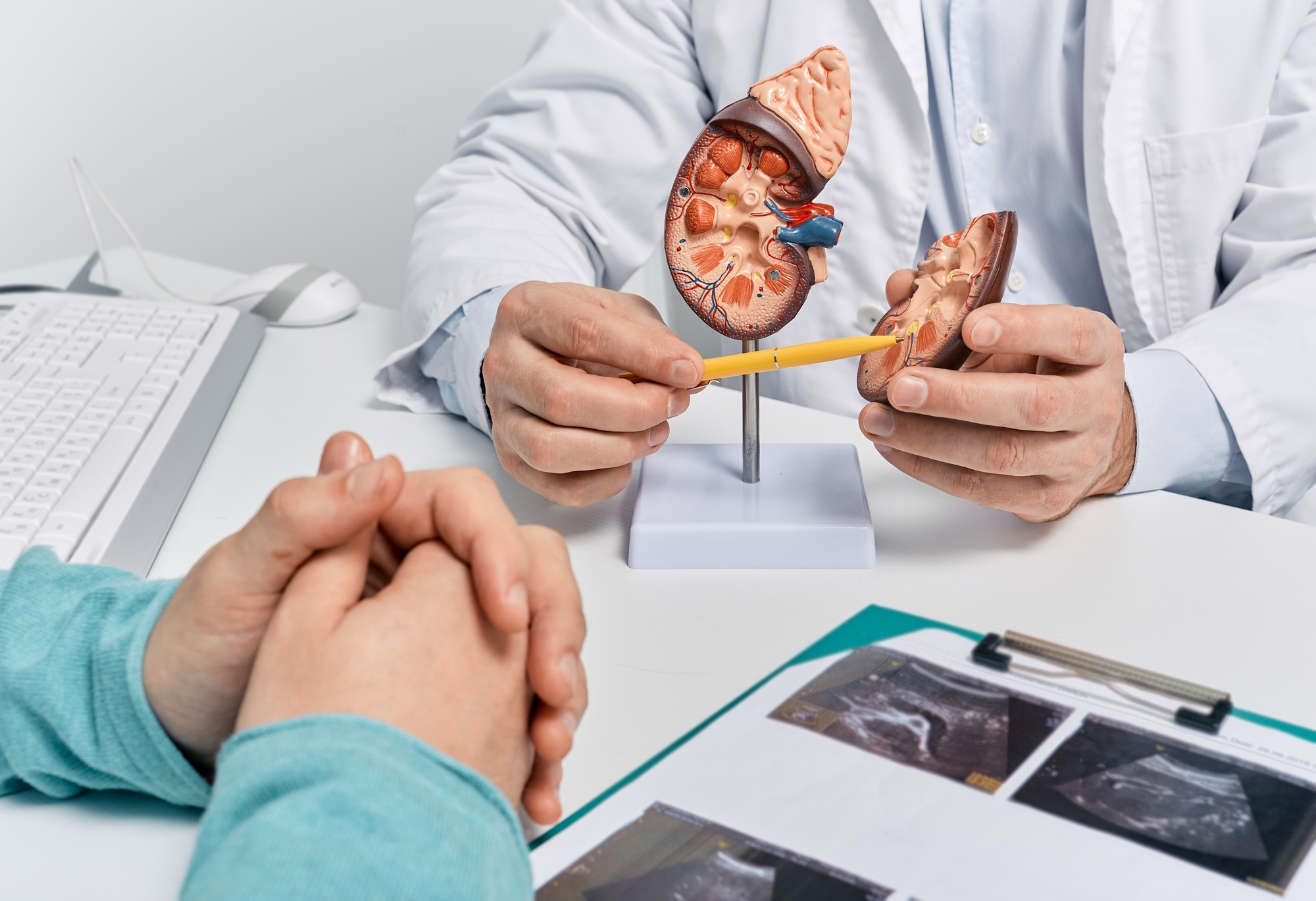Kidney Location in the Body
Before delving into what kidneys do, let’s discuss where they are located. The kidneys are two organs located on either side of the spine, just below the rib cage. Specifically, they are in the back of the abdominal cavity, nestled against the muscles of the back. Each kidney is about the size of a fist, and while most people have two, some are born with only one. In such cases, the single kidney adapts to take on the workload of two, showcasing the remarkable adaptability and resilience of renal tissue. Their strategic placement in the body safeguards them from physical trauma and allows them to effectively manage blood flow and filtration.
How Many Kidneys Does a Person Have?
The answer to “how many kidneys does a person have” is typically two. However, variations exist due to congenital conditions or surgical removal, so it’s not unusual for someone to live with one kidney. In fact, many people with a single kidney lead normal, healthy lives, as the remaining kidney compensates by growing larger and increasing its efficiency. This adaptability highlights the kidneys’ vital importance and their ability to maintain bodily functions even under compromised conditions. Furthermore, advancements in medical science have made kidney transplants and dialysis viable options for those with kidney failure, allowing them to maintain a quality of life.
What Do Kidneys Do? Understanding Their Multifunctional Role
The kidneys do much more than filter waste. Let’s explore seven key functions that highlight their importance in maintaining health. Each function underscores the kidneys’ role in sustaining life and ensuring that our internal environment remains stable and conducive to healthy living.

1. Filtration of Waste and Formation of Urine
The primary function of the kidneys is to filter waste and excess substances from the blood to form urine. This process removes toxins and helps maintain a stable balance of salts and other substances in the blood, preventing the buildup of harmful waste products. The filtration process involves millions of tiny units called nephrons, which meticulously filter the blood and ensure that only waste products are excreted, while essential nutrients are reabsorbed. By continuously cleansing the blood, the kidneys play a critical role in preventing toxic overload and supporting overall metabolic balance.
2. Blood Pressure Regulation
The kidneys play a crucial role in controlling blood pressure. They adjust the volume of blood (by eliminating excess water) and release the enzyme renin, which helps regulate blood pressure. When blood pressure is low, the kidneys secrete renin to increase it, ensuring it stays within healthy limits. This regulatory mechanism is part of the renin-angiotensin-aldosterone system (RAAS), which is a complex hormonal cascade that helps maintain blood pressure and fluid balance. By fine-tuning blood volume and vessel constriction, the kidneys ensure that vital organs receive adequate blood supply.
3. Electrolyte Balance
Electrolytes like sodium, potassium, and calcium are vital for many bodily functions, including nerve signaling and muscle contraction. The kidneys maintain the right levels of these electrolytes by filtering and reabsorbing them as needed, ensuring your body functions smoothly. Imbalances in electrolytes can lead to severe health issues, including arrhythmias and muscle weakness, underscoring the importance of the kidneys’ regulatory role. By monitoring and adjusting electrolyte levels, the kidneys help maintain electrical stability and fluid equilibrium in the body.
4. Acid-Base (pH) Balance
To function optimally, the body needs to maintain a stable pH level. The kidneys help regulate the body’s acid-base balance by excreting hydrogen ions and reabsorbing bicarbonate from urine. This process keeps your blood from becoming too acidic or too alkaline, which is crucial for the proper functioning of enzymes and metabolic processes. The kidneys work in concert with the respiratory system to maintain this delicate balance, allowing the body to adapt to various metabolic demands and environmental conditions.
5. Red Blood Cell Production
What does the kidney do to assist with blood? The kidneys produce erythropoietin, a hormone that stimulates red blood cell production in the bone marrow. This ensures that your body has enough red blood cells to transport oxygen efficiently. Adequate oxygen delivery is vital for energy production and overall cellular function, making erythropoietin production a key aspect of kidney function. In conditions where oxygen levels are low, such as high altitudes or anemia, the kidneys respond by increasing erythropoietin output to boost red blood cell production.
6. Detoxification of Drugs and Toxins
Apart from filtering waste, the kidneys also detoxify the body by removing drugs and toxins from the bloodstream. This detoxification process is vital for preventing the accumulation of harmful substances that can damage organs. The kidneys’ ability to metabolize and excrete foreign compounds is essential for protecting the body from the adverse effects of medications and environmental toxins. By breaking down and eliminating these substances, the kidneys support the liver’s detoxification efforts and contribute to overall systemic health.
7. Support for Bone Health
The kidneys help maintain strong bones by regulating calcium and phosphate levels and producing calcitriol, the active form of vitamin D. Calcitriol aids in calcium absorption from the diet, supporting bone growth and remodeling. Proper regulation of calcium and phosphate is critical for bone density and structural integrity, highlighting the kidneys’ role in skeletal health. In cases of kidney dysfunction, imbalances in these minerals can lead to bone disorders, emphasizing the interconnectedness of kidney function and bone health.

How Do Kidneys Work? Understanding the Filtration Process
The kidneys filter about 200 quarts of blood daily, producing about 1 to 2 quarts of urine. This filtration involves several steps:
Glomerular Filtration
Blood enters the kidneys through the renal artery and passes through tiny filters called glomeruli. These filters allow water and small molecules to pass into tiny tubules while keeping larger molecules, like proteins and blood cells, in the bloodstream. This selective filtration is the first line of defense in maintaining blood purity and ensuring that essential components remain in circulation.
Tubular Reabsorption
The kidneys reabsorb useful substances like glucose, amino acids, and certain salts back into the blood. This process ensures that essential nutrients are conserved while waste products are excreted. The reabsorption phase is highly regulated, allowing the kidneys to adjust nutrient retention based on the body’s current needs and dietary intake.
Tubular Secretion
The final step involves the active transport of waste products from the blood into the tubules, which are then excreted as urine. This step allows the kidneys to fine-tune the excretion process, ensuring that harmful substances are efficiently removed from the body while maintaining electrolyte and fluid balance.
The Right Lower Pole Kidney
The term “right lower pole kidney” refers to the lower section of the right kidney. This location is significant for medical imaging and diagnosis, as certain conditions or anomalies may specifically affect this area. Understanding the distinct positions and anatomy of each kidney aids healthcare professionals in diagnosing and treating kidney-related issues. For instance, variations in the position or structure of the right lower pole can be indicative of congenital anomalies or pathologies that may require targeted intervention.
Facts About Kidneys
- Size and Shape: Kidneys are about 4–5 inches long, resembling the shape of a bean.
- Blood Filtration: They filter around 50 gallons of blood every day.
- Urine Production: Your kidneys produce about 1–2 liters of urine daily.
- Regenerative Capacity: If one kidney is removed, the remaining one can enlarge and increase its capacity to maintain normal function.
How to Keep Your Kidneys Healthy
To ensure your kidneys function optimally, it’s essential to maintain a healthy lifestyle:
- Hydration: Drink plenty of water to help the kidneys filter blood effectively. Adequate hydration supports the kidneys’ filtration processes and helps prevent the formation of kidney stones.
- Balanced Diet: Eat a balanced diet low in salt and rich in fruits and vegetables. Nutrient-rich foods provide the necessary vitamins and minerals to support kidney function and overall health.
- Regular Exercise: Engage in regular physical activity to maintain a healthy weight and blood pressure. Exercise improves circulation and reduces the risk of conditions that can impair kidney function, such as hypertension and diabetes.
- Avoid Smoking: Smoking can damage blood vessels, reducing kidney efficiency. By abstaining from tobacco use, you protect the vascular health of your kidneys and reduce the risk of kidney disease.
Conclusion
In conclusion, the kidneys are vital organs with diverse roles beyond just filtering waste. By understanding their functions and maintaining a healthy lifestyle, you can support your kidneys in keeping your body balanced and healthy. These organs are integral to numerous physiological processes, and their health is paramount for overall well-being. Regular check-ups and a proactive approach to kidney care can further ensure their long-term functionality and your quality of life.

